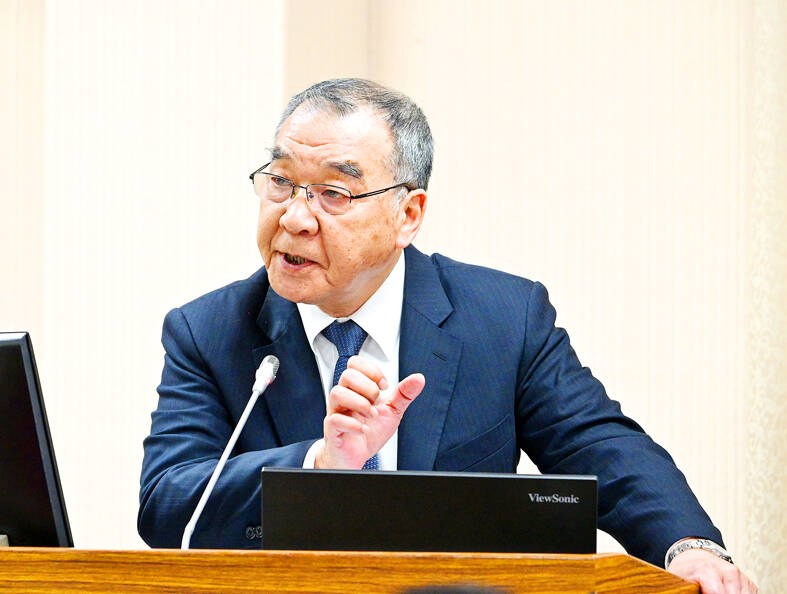The military remains on alert following comments made online that China was simulating a military strategy aimed at removing Taiwan’s leadership, Minister of National Defense Chiu Kuo-cheng (邱國正) said yesterday.
Military enthusiast Joseph Wen (溫約瑟) yesterday wrote online that a bombing range in Alxa Left Banner in Inner Mongolia, an autonomous region in northern China, has a similar layout to Taipei’s Boai Special District (博愛特區).
There is a high concentration of ministries and other government buildings in Boai Special District. The Presidential Office Building is in the center of the district.

Minister of National Defense Chiu Kuo-cheng speaks at the Legislative Yuan in Taipei yesterday.
Any country with the ambition and wherewithal to do so would build facilities that simulate its target, Chiu said.
Taiwan would also do so if it had the space for such facilities, he added.
The alleged site is a warning, and the military would be on guard for such strategies, Chiu said.
The Chinese People’s Liberation Army (PLA) has previously made mockups of Taiwan Taoyuan International Airport and Taipei, he said.
Instead of worrying about the possibility of such attacks and strategies, the military’s task is to plan for the worst, Chiu said.
The military will continue to train as before and react accordingly, Chiu said.
Asked about tensions in the South China Sea, Chiu said that he is not a man of empty words and would be ready, regardless of any developments in the region.
Chiu said he was unaware of the Ministry of Digital Affairs’ announcement that it was preparing a wartime network.
However, he would speak with the Ministry of Digital Affairs to determine whether such a network would be included in this year’s Han Kuang exercises, Chiu said.
Asked about former National Security Council secretary-general Ting Yu-chou’s (丁渝洲) suggestion that the military should set war termination criteria, Chiu said he would not comment on others people’s opinions.
“The military’s termination criteria are that we will go as far as the other side is willing to,” he said, adding that he does not personally consider that a criterion for ending a war.
Whether the government should set such criteria is above his pay grade, he added.
Taiwan People’s Party (TPP) Legislator Chang Chi-kai (張啟楷) asked Chiu whether he would change his answer if President Tsai Ing-wen (蔡英文) or president-elect William Lai (賴清德) posed the same question.
Chiu said he knew his role and place and would state his answer accordingly, but no one has asked him such a question yet.
It is best to refrain from starting a war and fight cautiously, Chiu said, adding that there are no winners in wars.
Additional reporting by CNA

The Ministry of Economic Affairs has fined Taobao NT$1.2 million (US$36,912) for advertisements that exceed its approved business scope, requiring the Chinese e-commerce platform to make corrections in the first half of this year or its license may be revoked. Lawmakers have called for stricter enforcement of Chinese e-commerce platforms and measures to prevent China from laundering its goods through Taiwan in response to US President Donald Trump’s heavy tariffs on China. The Legislative Yuan’s Finance Committee met today to discuss policies to prevent China from dumping goods in Taiwan, inviting government agencies to report. Democratic Progressive Party Legislator Kuo Kuo-wen (郭國文) said

The Ministry of Economic Affairs has fined Taobao NT$1.2 million (US$36,900) for advertisements that exceeded its approved business scope and ordered the Chinese e-commerce platform to make corrections in the first half of this year or its license would be revoked. Lawmakers have called for stricter supervision of Chinese e-commerce platforms and more stringent measures to prevent China from laundering its goods through Taiwan as US President Donald Trump’s administration cracks down on origin laundering. The legislature’s Finance Committee yesterday met to discuss policies to prevent China from dumping goods in Taiwan, inviting government agencies to report on the matter. Democratic Progressive Party

Taiwan and its Pacific ally Tuvalu on Tuesday signed two accords aimed at facilitating bilateral cooperation on labor affairs, according to Taiwan’s Ministry of Foreign Affairs (MOFA). The governments inked two agreements in Taipei, witnessed by Foreign Minister Lin Chia-lung (林佳龍) and visiting Deputy Tuvaluan Prime Minister Panapasi Nelesone, MOFA said in a news release. According to MOFA, the agreements will facilitate cooperation on labor issues and allow the two sides to mutually recognize seafarers’ certificates and related training. Taiwan would also continue to collaborate with Tuvalu across various fields to promote economic prosperity as well as the well-being of their

Sung Chien-liang (宋建樑), who led efforts to recall Democratic Progressive Party (DPP) Legislator Lee Kun-cheng (李坤城), was released on bail of NT$80,000 today amid outcry over his decision to wear a Nazi armband to questioning the night before. Sung arrived at the New Taipei District Prosecutors’ Office for questioning in a recall petition forgery case last night wearing a red armband bearing a swastika, carrying a copy of Adolf Hitler’s Mein Kampf and giving a Nazi salute. Sung left the building at 1:15am without the armband and covering the book with his coat. Lee said today that this is a serious